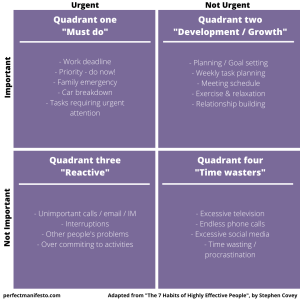Last week I discussed the idea of sacrificing sleep to enable you to dedicate time to goals, testing this out in practice, where I found it only left me feeling sleep deprived.
This made me conclude it wasn’t we needed to hack our way to having more time in the day, we just need to get better how we manage time.
 In Stephen Coveys book The 7 habits of highly effective people, the biggest lesson from his book, was the quadrant which detailed how to manage time effectively.
In Stephen Coveys book The 7 habits of highly effective people, the biggest lesson from his book, was the quadrant which detailed how to manage time effectively.
Before I get to that, to help you understand the purpose of the quadrant, I discuss Covey’s concept of P / PC, where:
P means the outcome produced by an action
PC means the actor producing the action
Basically you need PC to produce P.
Therefore if you have a tractor (PC), that can plough fields for crop production (P), but if don’t take the time to maintain the tractor, you will inevitably cause it to breakdown and no longer be able to plough the fields, losing your means of production.
The same is true for people, we need to take time out to look after ourselves so we can keep performing effectively in everything we do.
Which takes us to the quadrant:
From the diagram you can see how activities are split into four grids to show the typically things done in a day and whether they are Urgent / Not Urgent and Important / Not Important.
They are:
Quadrant one – Important / Urgent:
Critical tasks that need doing, too much focus on this and you are liable to burnout and come a victim to stress. These are what Covey refers to as P.
Quadrant two – Important / Not Urgent:
This is focused on PC activities, the development to self, working on self-improvement, planning, relationship building, wellbeing and health. These are important to develop in helping to achieve quadrant one activities.
Quadrant three – Not Important / Urgent:
This is things that might be important to other people we get dragged into and usually is done on a reactive basis, taking focus away from Quadrant one priorities and Quadrant two development.
Quadrant four – Not Important / Not Urgent:
These are what are considered personal timewasters, the quick easy gratification that doesn’t really contribute to anything and doing this too much means you won’t achieve anything and sacrifice time on more pressing requirements.
By understanding this, you can use the quadrant to help create discipline in your life so you are getting the quadrant one activities done and doing much less of quadrant three and four activities.
This enables you free time to invest in quadrant two activities, which is an investment in your development making you a more effective person, while allowing you to reflect, grow and recover.
Just by having time to work on your development you can potentially develop tools, systems and knowledge to get better at carrying out the critical tasks in quadrant one, allowing more time to focus on nurturing activities!
Next week I will be covering off greater understanding of the quadrants to help make you more effective in utilising your time, so please do join my mailing list for updates.


One thought on “How applying the 7 habits of highly effective people quadrant theory helps manage time”